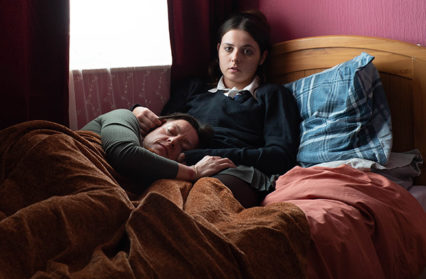Emily Garside reviews the new comedy-drama from BBC Wales, In My Skin, a dark teenage coming-of-age story, starring Gabrielle Creevy.

BBC Wales’s In my Skin realises something: that there is humour in drama. Writer Kayleigh Llewellyn draws on her own experience as the teenager of a Bipolar parent as we follow central character Bethan (a brilliant Gabrielle Creevy) as she copes with life – or her lives – as she creates a world for herself within which she can cope with the dysfunctions. But we also get a charming and funny coming-of-age teen drama that manages to embrace the humour in the darkness; In My Skin is a “teen-drama” but it’s not just a drama for teenagers, and its appeal will be felt across age ranges.
Teenagers are allowed to be teenagers. So much television writing nowadays creates teenagers who do not ring true, who are heightened or indeed lowered. In My Skin presents teenagers we encounter; teenagers we were. There’s also a really clear understanding of the spaces occupied by teenagers in Llewellyn’s writing – from school, to with friends, to home. This works particularly well in showing the different ‘versions’ of Bethan; indeed it shows the different facets of all teenagers that exist often unseen by others. Alone with friends, Bethan is the party girl, the cool girl, the one who drinks and takes whatever is offered, and ‘doesn’t give a fuck’. She thinks the school and everyone in it aren’t worth her time. And this paints a nuanced picture of teenage friendship. There is a tight-knit group of three in Bethan’s life. She and Lydia (Poppy Lee Friar) and Travis (James Wilbraham) have a rebellious alliance, mainly built on getting drunk/high and giving the finger – literally and figuratively – to school and teachers. So far, so teenager drama.
In school, we see most keenly Bethan’s conflict. Bethan is torn between the desire to be accepted and the fear of rejection – we see this with her close friends, but also with the ‘cool kids’, and again in her attitude to her own academic achievements. It’s a swirling mess of teenage emotions that resonate however long ago you left High School.
Bethan finds escape in creativity, encouraged by Ms Morgan (Alexandria Riley), a teacher who clearly has students interests at heart but delivers lessons with dry humour and a low tolerance for disruptive behaviour in class. Bethan finds herself torn between creative writing, embodied in a set task that might actually be helping her own mental health, and the world of teenage popularity, which is always louder than everything else in the room.
What it can’t drown out, of course, is that final element in Bethan’s life, and what is the backbone of Llewellyn’s story: home life, and her Mum’s mental health struggles. In an early scene, we see Bethan’s mum (Jo Hartley) frantically washing her car in the dead of night. Soon after, Bethan is with her in a hospital waiting room, and the next time we see her she’s a resident, having been sectioned, and not for the first time. Watching Bethan deal with this alone – her Father (Rhodri Meilir) largely absent, leaving her to it. In My Skin unflinchingly, and without sentimentality, shows the reality for Bethan as this ‘real world’ buts against her school and social life.
Another crucial element of BBC Wales’ In My Skin is the implied impact of poverty. Specifically, the unique ways poverty is felt by teenagers. It’s not mentioned overtly but shown in the little things. Bethan lies about what she’s had for lunch, she gets home and the gas is off and she spends the evening sat in her coat. And when she’s mocked for her period seeping through her gym kit in P.E. nothing is said, but the question is there – it is because she couldn’t afford sanitary products? Probably. It’s built up slowly, as a backdrop to the central story of her mum’s struggles, but it’s an important theme in Llewellyn’s writing. The experience is different for working-class families facing these challenges, to that of their better-off counterparts. And it’s easier for teens like Bethan to fall through the gaps.
But all of this should not take away from the fact Kayleigh Llewellyn’s writing is funny, and Director Lucy Forbes has a good eye for the naturalist comedy moment. In My Skin is frequently laugh-out-loud funny. Still, the teenagers sound like teenagers; the sarcastic, fed-up teachers sound like teachers who have heard it all before and are giving some back. These are people finding the humour both in everyday life and in the darkest of times. And Television writing of late has tended to veer to one or the other: outlandish comedy so outlandish it loses root in reality, or drama so dark it loses its humanity. People are funny, even, and especially, when things get rough. In My Skin feels like the real world, these characters feel like people we know, and that’s what the real power in the writing is.
In My Skin is available now on the BBC iPlayer.
Emily Garside is a regular contributor to Wales Arts Review.











